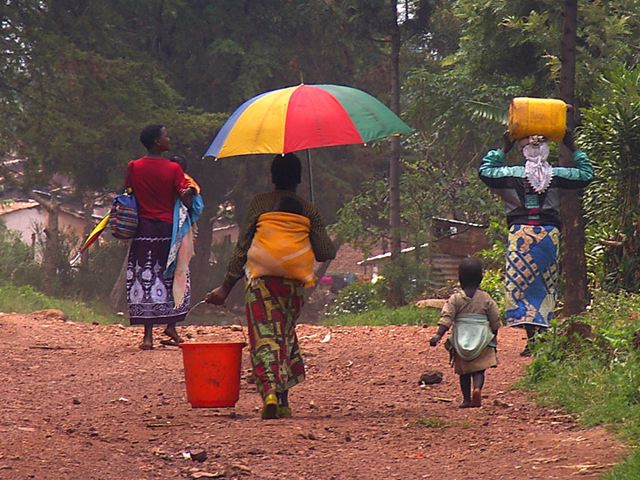
Monday, June 9, 2008. Kigali, the capital of Rwanda.
I awake early and hear my hostess Shirley Randell swimming in her pool. The goat outside my window bleats. A bit later Shirley, dressed in the sari that’s her daily costume, is rushing off to work.
I arrived yesterday, bleary and beat. Shirley was on the patio with two friends, a tureen of soup, hunks of hearty bread and Rwandan beer on the table. I managed a modicum of cheer despite my exhaustion. Shirley will be my hostess and landlady the next three weeks, as well as the organizer of my volunteer project.
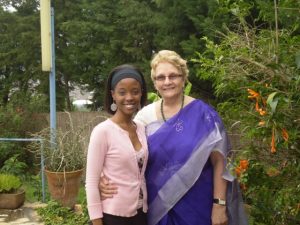
Shirley Randell, right. With Tupo Mtila, a delightful young woman from Malawi who stayed at Shirley’s house the same time I did. Tupo’s aunt Joyce Banda later became the President of Malawi
I’m here to conduct a series of interviews with members of RAUW (Rwanda Assn. of University Women), a professional organization that Shirley started. These are educators, businesswomen and politicians who generate educational opportunities for Rwandan girls and shed light on domestic violence and AIDS prevention. I’ll write profiles from each of the interviews, and Shirley will post them on the RAUW website.
My friend Simin Marefat, a San Francisco nurse who spent time in Rwanda in 2007, made the introduction. Shirley is 68, Australian, and has worked all over the world for humanitarian organizations. Raised her four children in rural New Guinea, spent years in Bangladesh and the South Pacific island of Vanuatu. She’s been in Rwanda three years, working for SNV, a Dutch development organization. Always in motion, juggling several balls in the air. Knows absolutely everyone in Kigali’s expat community.

Paul Kagame, president of Rwanda since 2000, was commander of the Rwandan Patriotic Front that ended his country’s horrific 1994 genocide.
Shirley’s house is in Kiyovu, an upscale section of Kigali where Rwanda’s president, Paul Kagame, also lives. Good restaurants nearby. Also the Hotel Milles Collines, which we saw in the movie Hotel Rwanda. That’s the hotel where the temporary manager Paul Rusesabagina (played in the movie by Don Cheadle) sheltered 1,268 Tutsis and moderate Hutus, saving them from slaughter by Hutu militia.
Wednesday, June 11. Kigali.
Rwanda is one of Africa’s tiniest countries and the most densely populated. It’s the size of Vermont, with the population of Chicago – 10 million people. And yet, there’s an amazing orderliness to Kigali. The streets are clean. The traffic isn’t horrendous as in most African cities. It’s a dream compared to Nairobi – there isn’t that same sense of chaos.
Fourteen years ago, the city was decimated. Homes, schools and hospitals trashed. I’ve learned that few of the city’s pre-genocide residents remain. Kigali was rebuilt by Tutsi exiles, many of them living for decades in Uganda, the Congo, Kenya and Europe. Once the genocide ended, they repatriated to Rwanda, determined to reclaim their country. The genocide claimed 700,000 to 1 million people, but an equivalent number of exiles returned to Rwanda in the year following the genocide. Today, Rwanda is one of only three countries in the world with a female majority in the national parliament.
Thursday, June 12. Kigali.
I’m sitting on the terrace at Bourbon Coffee, a Starbuck’s-like café. It’s a total disconnect: a social nucleus for networking expats, NGO workers and the local elite, umbilically linked by laptops and cell phones to the great Cyber-Mommy. The Rwandan clientele are beautifully dressed, polished and confident. The wait staff look American in their jeans, styled hair and trendy T-shirts. This is an oasis of the privileged. Customers with laptops gets a complimentary Internet access code for an hour when they buy a drink and/or food item. We could be in Santa Monica, Sedona or Santa Fe.
I hire a Moto – a motor scooter that functions as an alternate taxi, for one fifth the price – to the main road to change money. Then take a cab to the Rwandan Women’s Network offices to meet with Mary Balikungeri. The driver goes 10-15 minutes outside the town centre, through a series of dirt roads into neighborhoods so ramshackle I start to think he’s lost. Finally I see the sign for Rwandan Women’s Network. I’m 30 minutes late, which means very little here.
I like Mary. Forthright, as Shirley promised. Energetic, strong, a robust sense of humor. Very take-charge. She won’t let me turn on the tape recorder until I explain who I am and what I want to talk about. She immediately determines that, since I’m a San Francisco Chronicle journalist, I shouldn’t restrict my reporting to Shirley’s RAUW website but should also profile the Rwandan Women’s Network for the Chronicle. She’s a bit of a general.
She left Rwanda with her family when she was small and lived in Uganda until 1995, one year after the genocide. Mary offers me literature and a DVD on her organization at the end of the chat, then brightens and seems genuinely happy when I say “J’ai racines Africaines” (I have African roots). “Yes?” she says. “My mother was born in Cameroun and her parents were missionaries.” “Then you are family!” she exclaims. “You are a missionary’s child.”
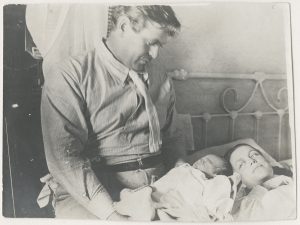
My missionary grandparents, Fred and Roberta Hope, 1912. In Cameroun with their first-born child Arta Grace.
This is so powerful for me that I look down and clench my teeth not to cry. I’m very proud of my grandparents Fred and Roberta Hope — especially my grandfather’s work operating an industrial school that gave self-sustaining trades to the men of Cameroun. In the U.S., when I mention my grandparents’ work there’s typically a chilled silence. “Missionary” is a loaded word and no one stops to consider that a lot of valuable work was done by ecumenical workers. Only in Africa, among African Christians, do I get a sense of appreciation or enthusiasm.
The sun is falling and I can hear the traffic down the hill. Faint dog barks, a whistle, the insistent rhmmmm! of a Moto bike and the sassy, unruly call of a tropical bird. It’s six o’clock, just a half hour until Rwanda’s early nightfall. When you’re this close to the Equator, the divide between daytime and nighttime is suprisingly sudden, and occurs at the same time all year long.
Monday, June 16. Kigali.
Late in the afternoon I meet with Stephanie Nyombayire. A remarkable young woman who lived the past seven years in the U.S. – three in a boarding school in Connecticut and four at Swarthmore College in Pennsylvania. She’s just graduated, and is back in Kigali working for Orphans of Rwanda.
Stephanie is pretty, could be a model, and in fact was featured twice in Glamour magazine: the first time when she and other Swarthmore undergrads started Genocide Intervention Network, a campus organization for Darfur relief; the second time when she was selected one of the top 10 college women of 2007.
Stephanie was born in exile to Tutsi parents, in Kinshasa, capital of the Democratic Republic of Congo, and lived there until she was 7 – the year of the genocide. Her family returned to Rwanda that year and she went to a French-speaking school, Ecole Belgique, until she won a scholarship to Kent School in Connecticut at 15.
“A lot of Rwanda is made up people who are very young,” Stephanie says. “A lot of them don’t have parents because of the genocide and a lot of them had to raise younger siblings from the age of 10. So I’ll be trying to focus on youth and opportunities that will move them forward.”
Thursday, June 19. Kigali.
Just returned from the Ministry of Education and a very strong interview with Odette Mukazi, a great woman who coordinates the Rwanda chapter of FAWE (Forum for African Women Educationalists). It’s a pan-African organization that encourages girls to stay in school, where they often drop out after primary school and in general are intimidated by boys. Tuseme (Swahili for “speak out”) is their major initiative, aimed at empowering girls and focusing on their specific education issues. They’re partnered with Orphans of Rwanda and a lot of their girls receive ORI scholarships.
Odette is dynamic – not as animated as Mary Balikungeri but a force nonetheless. She tells me about growing up in exile in Uganda, her daughter Matilda who is in a U.S. law school, her return to Rwanda so soon after the genocide ended. When I ask if she’d lost a lot of family in the genocide, Odette pauses and becomes silent. “Yes, so many. I have no idea how many.” I start to cry, clench back my tears. It’s as if everything I’ve heard or learned in the last weeks, now accumulated, comes rushing toward me in a flood of grief.
Odette begins to cry and for a few minutes neither of us can speak. I grab a Kleenex. I say to her, “I am so sorry,” but barely get the words out. I’m not sure but I suspect she appreciates that I felt the enormity of her grief. Are African men taught not to cry?
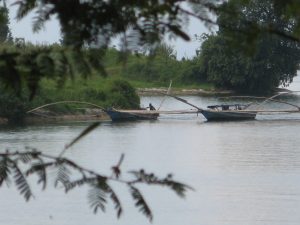 Gradually she composes herself and speaks about FAWE and the results she’s seen in young women. When I ask about her two daughters she says, “Yes! They are very empowered!” The one in law school even confronted a Rwandan man – a former Hutu militia, in exile to escape prison – who spoke on her campus and claimed the genocide never happened! According to Odette, Matilda stood up and said, “Excuse me! I am Rwandan and there absolutely was a genocide.” The man blew more steam and Matilda stood up and walked out. “He didn’t expect there would be a Rwandan in the audience,” Odette says.
Gradually she composes herself and speaks about FAWE and the results she’s seen in young women. When I ask about her two daughters she says, “Yes! They are very empowered!” The one in law school even confronted a Rwandan man – a former Hutu militia, in exile to escape prison – who spoke on her campus and claimed the genocide never happened! According to Odette, Matilda stood up and said, “Excuse me! I am Rwandan and there absolutely was a genocide.” The man blew more steam and Matilda stood up and walked out. “He didn’t expect there would be a Rwandan in the audience,” Odette says.
Monday, June 23. Kigali Airport.
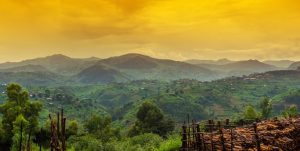 I’m on my way home. Said my goodbyes at Shirley’s house. Shirley was effusive with thanks when I wrote a $100 check to RAUW for one of the orphanages it supports. Many people asked these last days if I’ll be returning to Rwanda. Shirley kept saying it’s bound to happen — as if it were etched on a chart of my destiny, a fait accompli. I met some extraordinary people here and I’m amazed by the beauty of Rwanda, the resilience of the people, and the miracle of recovery that took place in the wake of so much hatred, bloodshed and loss.
I’m on my way home. Said my goodbyes at Shirley’s house. Shirley was effusive with thanks when I wrote a $100 check to RAUW for one of the orphanages it supports. Many people asked these last days if I’ll be returning to Rwanda. Shirley kept saying it’s bound to happen — as if it were etched on a chart of my destiny, a fait accompli. I met some extraordinary people here and I’m amazed by the beauty of Rwanda, the resilience of the people, and the miracle of recovery that took place in the wake of so much hatred, bloodshed and loss.


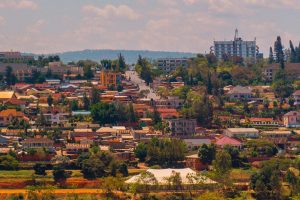
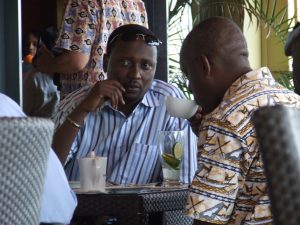
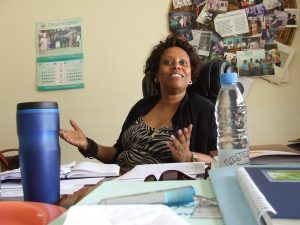
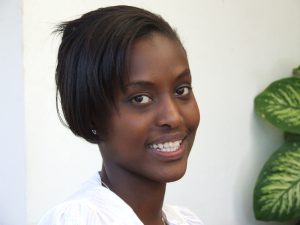
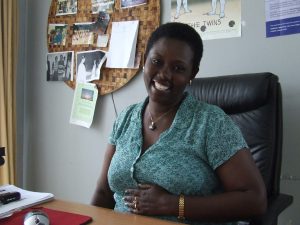

Wonderful story, Edward! You were volunteering to interview and write about these fascinating women. And they were volunteering their talents and energy for Rwanda, because even if they were getting paid (and I can’t tell if they were), they could certainly make more money in positions that were not focused on improving conditions in Rwanda.
Thanks!
Edward, what an adventure and valuable work to tell the world about these Rwandan women and their amazing resilience and achievements. This was the most moving story I’ve read in a long time.
Thanks, Marian!
Bless you Edward!
A wonderful, moving contribution to this prompt. I appreciate that you used the journal format here to give us some pertinent history and parallel the actual interviews. It really enhanced the personal nature of your experience, especially those moments when you shared your candid feelings. Thanks, Edward.
Thanks, Barbara! Rwanda was a great and fascinating experience for me. Very lucky.
The emotional heart of the piece, for me, and my favorite part of the narrative was when you revealed your own connection to Africa through your missionary grandparents–and included the bxw photo. . I would have liked to hear even more about that, and about why the history of missionary contributions is such contested terrain. and what people (other than the current Christians you mentioned) have to say about it. However, I recognize you were making it mostly about what these women were doing (and where they had been) and not about you. And you accomplished that very well.
p.s. Since you gave us the dates, I would have liked to know what year we were talking about.
It was 2008.
I love your story Edward. It is so beautifully written with interesting details and wonderful pictures. You made me want to know more about the remarkable women you interviewed. Thank you for sharing this.
Thanks so much, Laurie. I appreciate it. The journal from which I drew this story was actually much longer and I kept it brief for Retrospect. The women were all inspiring. I wish I knew how they’re all doing.
Thank you for sharing your amazing story of resilience, perseverance and strength in the wake of incredible violence and hatred. These women (for you seemed to profile mostly women) give us hope for a bright future (even 12 years ago). Their work, whether they are paid or not (and it seems that many started groups that are non-profits) are pouring their hearts and souls into making their country whole again.
You write with empathy and humanity, for the people you profile, for the country, and how it affected you. Now we are part of your journey.
Thanks, Betsy. Amazing indeed, their strength and perseverance. Appreciate your kind words.
A well-written story. You made me feel like I knew something of these women’s personalities and goals.
This story also brought back to me the memories of the 1994 genocide which flooded our news coverage back then. Now, a mere 26 years on, no one in the US seems to remember or talk about. I admit that it had long passed out of my memory. The country and people depicted in this work seem to exist in another world from that one.
Thanks, Dave.
Another excellent piece, Edward! Such great feeling and detail. What an amazing experience–one of many you have written about here!
Thank you kindly!
I can’t really add to what others have already said other than to note that both the story you were telling and the storytelling with which you told it were amazing (in the best, non-cliched sense of the word). Thank you for sharing this with all of us.
Thanks!